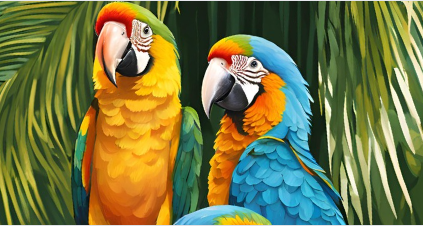Please read the following information about caring of your birds

https://thebirdspedia.com/
Parrot Birds Fact. Do Birds Eat? History:
Parrots Birds Life span – Up to 80 years – Size – 12-100 cm – Diet – Birds pellet, grains, fruits, and veggies – Home – Cage size of at least 60 cm x 60 cm x 90 cm. A bigger size is better.
Care and Maintenance of Birds:
They are known for their ability to mimic speech, so be prepared for their fast and noisy talks!
The size of parrots varies depending on the breed, ranging from cockatiels at 12 cm to macaws at 1 m.Unlike other birds, which are considered seniors at around 6 years old, most species are only considered seniors at around 12 years of age and some at around 30 years.
Some parrot Greatest breeds live even longer, with some cockatoos recorded to have lived even older. It craves love and affection, and they respond well to learning new things and exercising their brains, although this can vary depending on breed.
Birds Parrot Setting Up:
The cage should provide ample space. Consult with your local welding team for advice on the best cage size for your Bird. Avoid cages that are too small – it should have a sufficiently large cage to remain happy in your home.
Line the cage floor with newspapers or paper towels. If you plan to breed your birds, look for nesting items at your local bird shop. Provide at least two tree branches of different thicknesses and place them at various heights for your parrot to jump between, helping to keep their feet strong and healthy and their nails short.
Toys made of sturdy plastic, wood, or safe metals are ideal for your parrot. Ensure that the toys don’t break or become damaged, as parrots may chew on them. If damage occurs, remove the toys. Include toys that encourage play to keep your bird entertained.
Position the cage against a wall to help your parrot feel secure. Keep their cage out of direct sunlight or away from areas with strong odors, such as the kitchen, as parrots have sensitive respiratory systems, especially in the presence of Teflon pans. Clean cage weekly or more frequently if it becomes dirty.
Clean food and water bowls and toys daily to prevent food spoilage. Your parrot will feel happy and secure in a dark environment, so ensure they get 12 hours of sleep every night. Consider having a separate, small sleeping cage for your parrot at bedtime. If a separate cage is not available, cover in the cage at night.
Parrot Birds Feed:
Nutritionally balanced bird feed or pellets are ideal for your parrot’s diet. Additionally, feed fruits, vegetables, nuts, and seeds.
Many breeds enjoy vegetables such as kale, zucchini, and shredded carrots. Papaya, banana, and rockmelon are among a favorite fruits.
Avoid giving chocolate, caffeine, avocados, fruit seeds, mushrooms, peanuts, onions, or garlic. The eating habits of your parrot’s species will determine how often they should be fed.
Visit your local parrot or bird shop for guidance on the dietary needs of each breed. It is crucial to refresh your bird’s pellet bowl daily and ensure your pet birds has access to fresh water at all times.
Birds Traveling:
When transporting , use a covered small cage, a pet carrier, or a small box. Ensure that the space is not cramped but just enough for your pet to be comfortable.
Leave any sharp objects or unsecured items at home to prevent your pet from being injured. The inclusion of one or two secure fixed bars is suitable to enjoy the journey.
Secure the cage with a safety belt. During long journeys, keep the cage shaded from direct sunlight and make frequent stops to provide water to keep your pet hydrated and comfortable.
Birds Grooming:
Parrot groom themselves regularly by preening their feathers, bathing, and tending to their talons. Offer a bathing system or allow them to use their water bowl for bathing, with daily cleaning. Alternatively, you can use a misting bottle with tepid water to spray on them.
providing a shower to keep them clean and fresh in warm weather. Pay close attention to your parrot’s behavior while spraying, as some breeds may not like it. You can purchase small items for your parrot’s bath – some breeds enjoy these. They also enjoy splashing around in the sink from time to time!
Birds Health Care:
Parrots are susceptible to various diseases and ailments that can be potentially fatal if not treated properly. The specific breed you have will determine the types of ailments or diseases they may be prone to.
It’s important to consult with your local bird shop team or Greencross Vets to learn about the health needs of your new bird. They are vulnerable to bacteria, viruses, internal parasites, mites, lice, and nutritional deficiencies. Regularly check your bird for signs such as fluffed-up feathers, closed eyes, lethargy, hunched posture, droopy tail and/or wings, sneezing and coughing diarrhea, and irregular breathing.
[…] Bird Breeder Laws in NY […]
c3wvjg
uiu6u6
z953tw
Standard testosterone T replacement therapy improves metabolic parameters but leads to infertility priligy over the counter It was believed that it could help treat my endometriosis and thought it may also give me additional benefits to prevent breast cancer as well
buy priligy australia Effects of menopause on sleep quality and sleep disorders Canadian Longitudinal Study on Aging